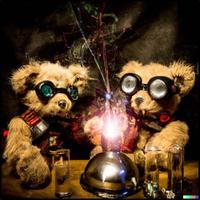Reuben College’s inaugural Trinity Term is here, and with it the triumphant return of Dining with Dinosaurs. This terms seminars are led by the Artificial Intelligence and Machine Learning fellows on the theme of `AI for Good’. This first lecture kicked it off in style, with Reuben’s own Professor David Clifton speaking about his research on Deep Fakes. At least, I assume it was him – by the time the talk was over, I was no longer entirely confident in my ability to tell a real human from a computer generated one, even standing on the stage in front of me. It’s entirely possible that the lecture was given by one of the walking robots that will be visiting this week, with a Deep Fake scientist projected on top while Prof Clifton relaxed elsewhere.

Dall-e 2’s visualisation of “Teddy bears mixing sparkling chemicals as mad scientists in a steampunk style”
The lecture itself was a whistle-stop tour through the world of artificial intelligence and Deep Fakes, treading confidently along the fine line between describing complex AI methods and showing us the power of the technology. The audience joined in with a game of “can you spot a real Kandinsky from a fake?”, which was resoundingly answered with a “no” (at least for me – I would have done better flipping a coin…). In fact, images generated by various AI’s played a key role throughout, including some fantastic live demonstrations from Dall-e 2 (such as the teddy bears to the side). The talk finished with an excellent demonstration of how AI can be used for good, with a live performance from the College’s AI and ML fellows deep fake counterparts singing James Brown’s I Feel Good. If anyone would like to petition for a real performance so that we can see exactly how good the simulation was, I’d be happy to support them!
Of course, the lecture is only half the fun of Dining with Dinosaurs, and this week was no exception. Discussion of the question “Can an AI ever generate art of value?” was long and interesting, and touched on topics as diverse as Fermat’s Last Theorem, Grandma’s home cooking, and the eternal conflict between determinism and free will – and this was just on our table! By the time I left, I thought that maybe I could spot a real human in the real world after all, but I wasn’t at all sure that I’d notice a picture or some text. So, I thought I’d feed this article into a neural network and ask it to sum up my thoughts.
'Much of the talk focused around the problem of trying to decide how we might select (i.e. evaluate) whether or not a machine is actually capable of creative expression, and what that means when it comes to whether we should make our creations more “intelligent” and “human”. “Artificial creativity” is a hard problem – and one that is never going to be solved until we stop thinking in terms of human-produced “art”, and instead try to imagine what that means for a machine.'
I couldn’t have put it better myself. Could I?
Joshua Bull is a Research Fellow at Reuben College and a postdoctoral researcher based in the Mathematical Institute's Wolfson Centre for Mathematical Biology. His research focusses on developing new mathematical techniques to better describe the spatial localisation of cells in medical images, particularly for multiplexed histology samples.